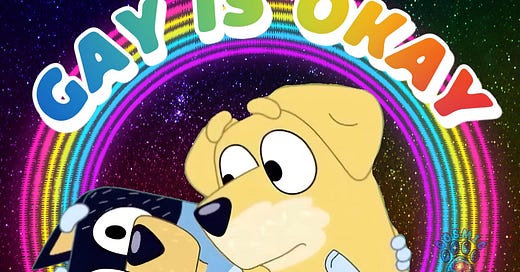Disney Unleashes New “Bluey” Film: A Gritty Exploration of Childhood Sexuality in the Age of MAGA
Percy T. Simperton
In an unprecedented move to "evolve and elevate" the Bluey brand, Disney has announced that the beloved animated series' upcoming feature film will take a bold new direction, exploring the intersection of sexuality, identity, and contemporary politics. To guide this daring reinvention, Disney has retained former Bud-lite marketing executive Alissa Heinerscheid, leveraging their power over the distribution of the cartoon to exercise creative control.
"Bluey: Awakening", set for release in 2027, promises to deliver a gritty, raw dog narrative that critics are already calling “the most daring exploration of animated dogs and social commentary since Scooby-Doo started eating marijuana cookies.”
The new film sees Bluey grappling with puberty, social ostracism, and gender identity, re-contextualized in a turbulent social and political landscape. Bluey, now identifying as a girl, has begun puberty blockers and takes to tucking while wearing frilly swim costumes to the pool. However, the growing physical side effects have dampened Bluey’s once-innocent zest for life, replacing it with lethargy and a newfound passion for political blogging. “I don’t play anymore. I think now,” Bluey declares while live-streaming a takedown of Trump, Vance, and Elon Musk from her/its room.
Meanwhile, Bluey's father, Bandit, embraces an emergent polyamorous lifestyle, encouraging Chilli to “explore her truth” with his eclectic circle of sexual partners, including Brett (a passionate kombucha brewer) and Celeste (a non-binary fire twirler). Chilli reluctantly joins in, confessing to friends at brunch that “it’s just what people do now,” while secretly battling her mounting insecurities and trying to get Bandit to be use protection.
Bingo, Bluey’s younger sister, begins facing ridicule at school, where classmates mock Bluey and call the family degenerates. Muffin, now an outspoken member of the online alt-right, spends her afternoons railing against globalist Jews and “faggots” on her podcast Muffin’s Rants. “Trump? He’s a moderate at best,” she scoffs, while dreaming of a Heeler-only ethno-state. Concerned about Bluey's gender identity and Bandit’s increasingly unconventional lifestyle, Muffin takes matters into her own paws by contacting social services. “Someone has to save Bluey from this woke circus,” she mutters, furiously typing out an email titled: Urgent: Heeler Family Unfit for Modern Society.
Meanwhile, Uncle Stripe and Aunt Trixie have spiraled into moral chaos. Stripe, recently laid off from his job in the public service for lewd behavior, turns to heavy marijuana use. Trixie, in an inspired narrative twist, develops a heroin addiction and begins a dark descent into prostitution to keep the family afloat. “Her journey is raw and real,” Disney execs explained while showcasing her character poster, which has since gone viral among college students.
The film crescendos into a bitter custody battle with the state after Bluey is reported to social services for an incident at school where it inappropriately touches another puppy in the toilets. Critics claim the scene is a daring exploration of teenage sexuality, and sees Bluey Awakening earn an R-rating. The ensuing courtroom drama pits Bluey’s family against a world increasingly skeptical of progressive parenting while grappling with what Disney calls “a MAGA-fueled witch hunt.”
“Bluey has always been about family, imagination, and resilience,” said series creator Joe Brumm in a press release, staring into the middle distance. “But this film pushes the brand into a space of social and political realism. Childhood isn’t all giggles and cartoons—it’s also about gender affirming care, polyamory, and the insidious reach of Trump’s America.”
For her part, Alissa Heinerscheid, defended the film’s direction. “Bluey needed to grow up. We’re celebrating diversity, pushing boundaries, and making this IP relevant for modern families. Plus, sodomy is huge with Gen Z.”

Early reviews have praised the film’s bold themes and uncompromising tone. Variety hails it as “a harrowing meditation on identity, despair, and Trump’s America—it will leave you broken and inspired.” The New Yorker writes, “This isn’t just a movie—it’s a reckoning. If you don’t see yourself in Bluey, are you even paying attention to your own privilege?”
While critics have embraced the film as a groundbreaking artistic triumph, suburban audiences are split. “Sounds like Bluey’s gay now,” remarked Jason Hicks, a perplexed father of three from Ohio. “I thought this was about dogs playing keepy-uppy. My kids liked that. What’s this now?”
Disney has reportedly doubled down on its confidence in the film, with executives confirming new merch lines including "Bluey: Poly and Proud" T-shirts, Bingo’s “Back Off MAGA” schoolbags, and limited-edition tucking and binding bathing suits.
As Disney steers Bluey into uncharted territory, one thing is certain: childhood—and animated dogs—will never be the same.




Who ever saw that coming...? Glad my children are now grown adults and only had the Marxist classics like Thomas the Tank Engine (the Fat Controller dressing like the Monopoly man was inspired as he exploited the working class locomotives to run his supply chain empire) and the gender uncertain Telly Tubbies - although no-one fat shamed them, and they seemed a bit 'slow' - and no-one picks on the retards...